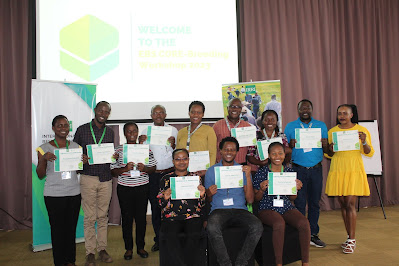Nairobi, Kenya - The International Rice Research Institute (IRRI)'s Enterprise Breeding System (EBS) Data Management and Breeding Operations recently brought together scientists and researchers from various African nations for a comprehensive training program. The week-long training focused on modern breeding strategies and the utilization of EBS concepts and tools in East and Southern Africa (ESA). Participants from Tanzania, Kenya, Mozambique, Burundi, Malawi, Madagascar, and Ethiopia attended the event, representing agricultural research institutions in their respective countries.
The training in Kenya on 17-22 May focused on enhancing skills in experiment planning and management using EBS, digitization of data collection, ensuring high-quality data, and effective data analysis and interpretation. Participants gained a deeper understanding of the importance of timely and accurate data submission, realizing the benefits of digitized data collection for efficient analysis. They actively engaged with the Fieldbook app, honing their data collection abilities and mastering the exporting and importing of data within the EBS. Additionally, participants learned how to effectively manage experiments within the EBS platform.
During the second part of the training, held in Burundi on 24-25 May , participants focused on the digitization and establishment of seed storage systems and other equipment. The training included the installation of seed storage systems, training staff members on using the system app, setting up barcode scanners, and configuring available printers at the research station. The workflow for harvest, post-harvest, seed processing, and seed storage was updated, and recommendations for further improvements were made.
The EBS training program aimed to equip African scientists and researchers with advanced breeding strategies and modern tools to enhance agricultural practices. By fostering the digitization of data collection and improving the management of experiments, the training sought to optimize research outcomes, accelerate scientific progress, and ultimately contribute to increased food security and sustainable agricultural development across African countries.
The training was deemed successful, with participants expressing their appreciation for the practical hands-on experiences and the invaluable knowledge gained. They now possess the necessary skills and tools to employ modern breeding strategies and efficiently manage data using the EBS. These newly acquired abilities are expected to advance agricultural research and help address the pressing challenges faced by African farming communities.
As IRRI continues to support capacity-building initiatives in Africa, the positive impact of such training programs on agricultural research and development is anticipated to be far-reaching.
###
Learn more about IRRI (www.irri.org) or follow us on social media and networks (all links down the right column).





No comments:
Post a Comment